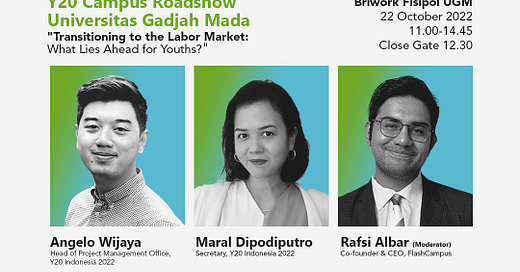[Y20 Seminar Recap] What Y20 Had To Say About Youth Unemployment... 💼
Last week, Y20 collaborated with 180DC to discuss about how youth are currently struggling to find ends meet in the competitive industry. Here's what they had to say...
Being in the early 20s is always confusing, considering that we are on the brink of being full-time employees. It is unimaginable and scary to think of how we would compete with our own friends to get into jobs and find our ends meet. Yet, as we speak, there are peers who are looking for jobs and yet none bats an eye at their application.
To be fair, career-hunting is TIRIIIIING. Yes, with capital letters because it contributes to 80% of our noisy thoughts at midnight.
Understanding that youth had been struggling a lot more in finding jobs, 180DC held a seminar with Y20 representatives, Maral Dipodiputro and Angelo Wijaya as they gave insights and validated our struggles in finding jobs. Find our brief reflection here.
Turns out, there are two main problems as to why we are still struggling in finding jobs…
Problem One: Still lacking in soft-skills… 🗣
There is a disparity between the skills given by the institution and the labor market exacerbated by the lack of willingness in youth to find out the skills needed. The labor market needs different types of skills that the education system cannot bring and it can be achieved through internship experience. Hence, high-end companies tend to seek employees with professional experience (internship, part-time, training, etc) who are mainly identified as someone who meets the industry standard. Nowadays, if we don’t have the right skills or minimum professional experience, it will diminish the chance of getting jobs faster.
Sadly, this means we cannot rely solely on skills taught by the institution. The skills we learn there, for the most part, are not applicable in the industry. For example, the knowledge in building a CV is excruciatingly necessary. But, we do not have a CV Building course during our academic years, but we were expected to know these things by default. This particular condition did not facilitate youth in becoming a competitive individual which resulted in the constrictive chance of finding a job.
At the end of the day, the system traps youth into meaningless jobs which don't add to the economy.
Problem Two: Not enough knowledge… 🧠
To begin with, the data decides that soft skills possessed by youth are insufficient to make them able to compete with the market. We are seeking to acquire the required soft skills by ourselves without qualified guidance. This affects the youths to apply for jobs for the sake of finding a job. As they do not have enough interest in the jobs, they were unable to present convincing during the interview sessions which drove them to fail at interview stage.
All of these drive into one single reasoning: Not meeting the industry standard…
The problem now is both structural-level and personal-level.
Government has to be aware that the market landscape has changed and it needs to accommodate the agility and necessary behavior to push forward. Perhaps by shifting the curriculum into connecting schools to the labor market to build curriculums that meet industry standards, coupled by student-to-work pipeline programs, can prove better benefits to youth and the economy. This could address the skills mismatch by strengthening regional and national labor market information systems to reduce asymmetries between jobseekers, civil and business employers, and education and training institutions. The education system could also focus on facilitating student-to-work pipeline through tailored career support services and qualified work-based learning placements, including apprenticeship as one of the alternatives to the university education path.
That’s for the government to act upon.
And for us?
We can up-skill ourselves by driving our natural curiosity to explore jobs that we are interested in. Underlining the adjective interested, it is extremely important to put your interests as your first priority into consideration. By understanding your interests, you would be able to find meaningful jobs that are sustainable for the rest of your life.
Angelo: When you try to explore your future career, don’t push yourself to a path that you know you’re going to suck. However, liking something doesn’t mean you are good at it, but please look into something that you like.
And what should I do if I can't do all of the options above?
When you’re not lucky enough to pick or do all available options, you will have to compromise. Life is uniquely yours to choose. There is no definitive, standard way of the ‘right’ career path or the ‘wrong’ career path because each person’s definition of success is different. It is completely your options to take whether you want to be a corkcicle owner or a little, ghibli-themed bakery across the Seine river.
You – and ONLY you could define your own success.
Maral: Everything’s gonna be OK!
With all the uncertainty and anxiety happening between finding your true identity and a job, working solely from the heart, being genuinely hard-working, and putting everything your 100% can create benefits and great changes in your life and social environment. Having doubts is always A-OK! It's an extremely common, humane thing to feel. Just remember to keep striding forward despite the uncertainty. Challenge your insecurity by tailoring your life to aim for the stars and start believing in yourself.




